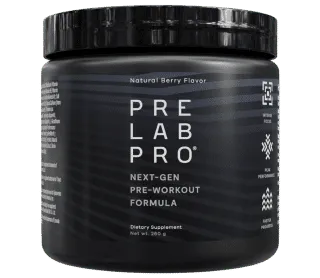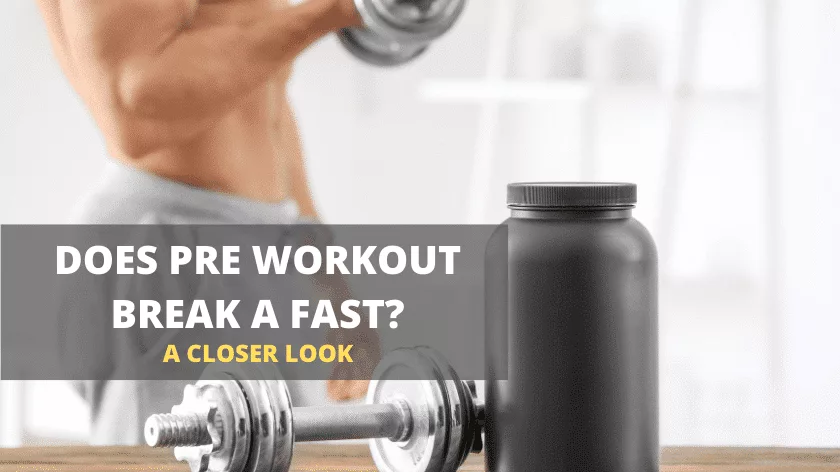There’s something about working out in the morning that feels so good. Maybe it’s the endorphin rush or the feeling of starting your day on the right foot. Whatever the reason, there’s no denying that a morning workout can be a fantastic way to start your day.
But if you’re following a fasting diet alongside your workout routine, you may inadvertently break your fast without realizing it.
Some pre-workouts include ingredients that can break a fast. So does that mean you have to skip your pre-workout if you’re fasting?
Not necessarily, as some pre-workouts don’t contain any fast-breaking ingredients. If you’re not sure whether your pre-workout will break a fast, check the label for any of the following:
- Sugar
- Artificial sweeteners
- BCAAs
If your pre-workout doesn’t contain any of these ingredients, it probably won’t break your fast. But if you’re still unsure, continue reading this article, which will give you a more in-depth understanding of how pre-workouts affect fasting.
What is Fasting and Why Do People Do It?
Fasting is the practice of voluntarily abstaining from food for a set period. Although fasting is often associated with religious observances, it can also be done for personal, spiritual, or health reasons.
People who fast typically do so for 12-24 hours, although some people may fast for shorter or even more extended periods. There are many different fasting plans, and people can tailor their fasts to meet their individual needs and goals.
There are several reasons why people might choose to fast. For some, fasting is a way to connect with their faith or spirituality. For others, it may be a way to detoxify the body or shed unwanted pounds.
It can even simply be a way to boost their energy levels or improve their overall health. Whatever the reason, fasting can be an effective tool for promoting physical and mental well-being.
How Does Fasting Work?
Fasting diets come in all shapes and sizes, but they all have one thing in common: abstaining from food for a set period.
During a fast, the body is forced to rely on stored energy sources, like glycogen and fat, for fuel. This process can lead to a number of health benefits, including weight loss, increased energy levels, and improved brain function.
And while there are a number of different ways to fast, one of the most popular methods is intermittent fasting – a pattern of eating that involves periods of fasting followed by periods of non-fasting.
You can do intermittent fasting in a number of ways, but the most common method is the 16/8 method. This involves fasting for 16 hours and eating all of your meals within an 8-hour window. You can adjust this fasting window to fit your needs and schedules, but the 16/8 method is a good place to start if you’re new to intermittent fasting.
The best way to find a fasting diet that works for you is to experiment with different approaches and see what feels best. There is no one-size-fits-all solution to fasting, so don’t be afraid to try different methods until you find the one that works best for you.
What Are the Benefits of Fasting?
There are a number of potential benefits that come with fasting. When done correctly, fasting can help improve your overall health in several ways, including:
- Weight loss: When your body burns stored fat for energy, it may help benefit your weight loss efforts [1].
- Reduced inflammation: Inflammation is a natural response to injury or infection. However, chronic inflammation can contribute to a number of diseases and health conditions. Fasting has been shown to reduce inflammation in the body [2].
- Lower blood sugar levels: Fasting can help regulate blood sugar levels and improve insulin sensitivity [3].
- Improved brain health: Fasting has been shown to boost cognitive function and protect against age-related mental decline [4].
Of course, not everyone will experience all of these benefits. And, as with anything, there are also some potential risks associated with fasting. These risks are usually only a concern if you fast for long periods or do not take adequate precautions.
If you’re thinking about trying fasting, it’s important to consult with your doctor first. This is especially true if you have any underlying health conditions or take medication.
Does Pre Workout Break a Fast?
If you’re serious about remaining in a fasted state, you’ll need to avoid anything that could break your fast – including both food and drink.
Pre-workout supplements are a popular choice for people looking for an energy boost before hitting the gym. However, many of these supplements contain ingredients that could technically break a fast, which we’ll discuss in this section.
BCAAs
Some pre-workout supplements contain the BCAAs (branched-chain amino acids) – isoleucine, valine, and leucine. Since these all contain a small number of calories, they may break your fast.
Every 10g of BCAAs is said to contain anywhere up to 50 calories, so it’s worth bearing this in mind if you’re trying to stay in a fasted state.
Sugar
Another ingredient that you may find in your pre-workout supplement is sugar, which not only contains calories but is probably the worst way to break your fast because it will cause insulin levels to spike.
Besides, consuming sugary drinks can offset any of the benefits you’re trying to gain from fasting in the first place, such as weight loss or improved blood sugar control.
Artificial Sweeteners
Although artificial sweeteners technically contain no calories, they can still potentially break a fast because some of them cause a spike in insulin. More specifically, sucrose and saccharin.
Each of these sweeteners can stimulate insulin secretion to some degree, which could break your fast. So, if you’re trying to stay fasted, it’s best to avoid pre-workout supplements that contain these sweeteners.
The Best Pre-Workout For Fasting
You’re looking for a pre-workout supplement that will help you take your performance to the next level but don’t want to risk taking something that might break your fast?
The problem is that many pre-workouts contain ingredients that’ll do just that. And when you’re trying to stay fasted, even a small amount of calories can be enough to end your fast in its tracks.
Pre Lab Pro is different. It contains no ingredients that will break your fast, instead focusing on a formula that’ll help you power through your workout and improve your overall performance:

- Natural caffeine (80mg)
- Red Beetroot Powder
- Setria® Performance Blend (L-Glutathione and L-Citrulline)
- L-Theanine
- L-Tyrosine
- NutriGenesis® vitamins and minerals
What are you waiting for? Head over to the official Pre Lab Pro website to get your hands on the best pre-workout for fasting today.
Summary – Does Pre Workout Break a Fast?
Pre-workout supplements can undoubtedly take your workouts to a whole new level. But when they get in the way of your fasting goals, you’ll probably have to think twice before taking them.
Luckily, there are products on the market containing zero calories, meaning they won’t break your fast. Pre Lab Pro is one of these products – the ideal solution when you want to boost your workout performance without jeopardizing your fast.





Leave a Reply